Wild mustard (Brassica rapa) is a wild herb of the mustard family that’s used widely across the globe, especially in the Pacific Northwest, as a vegetable and seed oil crop. Other common names include field mustard and, in the UK, charlock.
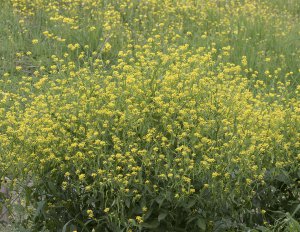
Wild Mustard is believed to originate from Europe and Central Asia, however, there’s not enough information to pinpoint its exact native origin. The Pacific Northwest was first introduced to wild mustard by means of crop production in 1864, and its use as a food crop, as well as its invasive nature, helped it to quickly spread across the rest of North America. Wild mustard has a peppery, spicy flavor that is used in salads, vinegar, and the Ancient Romans even added it to their wine for extra flavor.
Wild mustard is also allelopathic, which means it produces a compound that slows the growth of plants that surround it. The high oil content of wild mustard makes it the perfect fuel for the wildfires that wreak havoc in the Pacific Northwest when the plants shed their leaves and seeds.
Wild Mustard Edibility and Culinary Use
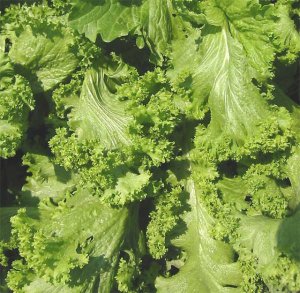
Most of the wild mustard plant is consumed, including the seeds, leaves, flowers, and roots. This temperate climate herb holds much of its spicy flavor in its leaves and seeds. Baby wild mustard leaves can be added to salads or sandwiches in place of lettuce, whereas older leaves are traditionally simmered to break down the toughness of the stalky leaves, similar to mature spinach leaves.
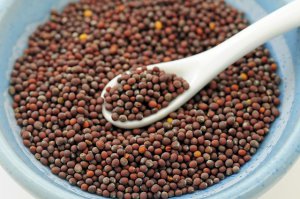
Wild mustard seeds can be used to create a mustard powder or the mustard condiment that people garnish their hot dogs with. To make your own mustard condiment, simply take your mustard powder from the ground mustard seeds and mix it with water and vinegar to create a paste.
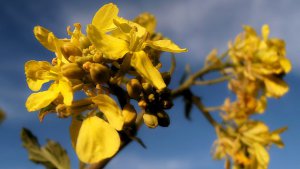
The flower buds are similar to broccoli in the sense that they cook well when stir-fried or cooked into sauces. The vibrant, yellow flowers are great additives to salads or vinegar for extra color and spiciness. Mustard flowers can also be ground or ran through the food processor with vinegar and spices such as salt, rosemary, oregano, etc., to create a paste similar to the condiment created from ground mustard seeds.
Wild mustard roots provide the mildest flavor of any part of the plant. Traditionally, they are grated and used in a horseradish-like sauce. It’s best to use a high-quality grater since the roots are very tough.
Wild Mustard Health Benefits
Wild mustard leaves, seeds, and stems have many health benefits. The leaves, commonly referred to as mustard greens, are excellent sources of calcium, iron, magnesium, potassium, zinc, selenium and manganese, while containing protein and small amounts of fat.
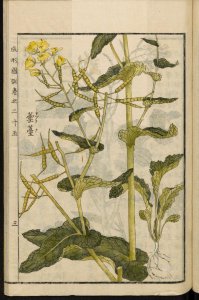
Wild mustard is also used in traditional Chinese medicine as a topical poultice that stimulates blood circulation, which is useful when dealing with rheumatoid arthritis and neuralgic pain. To make this wild mustard poultice, pulverize the seeds and mix with water, you can then apply this mash directly to the skin. Consult with your doctor if you are prone to mustard allergies or if you have open wounds.
Sinigrin, the active ingredient in mustard seeds, has been shown in studies to have anti-cancer, antibacterial, antifungal, antioxidant, anti-inflammatory, and wound healing properties.
Wild Mustard Cautions
Wild mustard has many health benefits, however, there are certain cautions in regards to food allergies, your digestive system, and where the plant is found. It’s common for people to be allergic or sensitive to plants in the mustard family. You should take extra precautions, especially if your family has a history of mustard allergies, by eating a small amount and waiting to see how your body reacts.
Due to the peppery flavor of wild mustard, it can upset one’s digestive system. Those who suffer from digestive issues, such as Irritable Bowel Syndrome and Crohn’s Disease, or are particularly sensitive to spicy foods should take extreme caution while consuming wild mustard as your digestive system might not respond positively to its consumption.
Due to wild mustard’s invasiveness, it will appear in the wild as well as fields used for crop production. While foraging for wild mustard in the Pacific Northwest, it’s best to avoid mustard patches in or near farmer’s fields due to the harmful insecticides and herbicides used in large-scale food production. Stick with wild mustard that grows in wild areas or in your yard to avoid any contaminated plants.
Conclusion
Wild mustard is a nutrient-dense potherb that is safe to forage throughout the Pacific Northwest. Its sweet, peppery taste makes it a great addition to salads, sandwiches, condiments, and other dishes that you’re looking to spice up. There are some precautions you should take in terms of consumption, mainly in regards to allergies and food sensitivities, however, feel free to forage as much wild mustard as you please with no concerns of overharvesting. If you wish to cultivate your own, it would be wise to keep it in a pot or to harvest the seed pods before they fall to the ground to prevent it from taking over your growing areas.
Written by Jared DeValk
Jared DeValk is an author, writer, and entrepreneur who in his free time can be caught hiking, planting berry bushes, or doing home repairs and improvements. Jared's varied life experience and passion for research empassions him to write knowledgeably about many topics such as , Health & Wellness, Real Estate, Finance, Business, Cryptocurrency, Home Improvement, Agriculture, Camping/Hiking, and many more. Jared can be reached directly for speaking, marketing, and writing inquiries at JaredDeValk.com.
Many of our readers find that subscribing to Eat The Planet is the best way to make sure they don't miss any of our valuable information about wild edibles.
See our privacy policy for more information about ads on this site


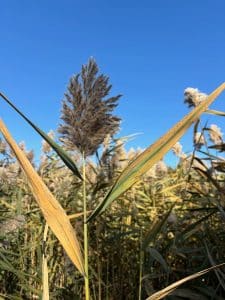
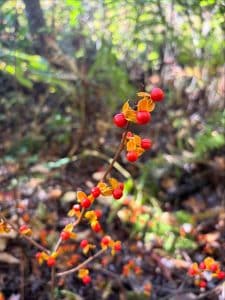
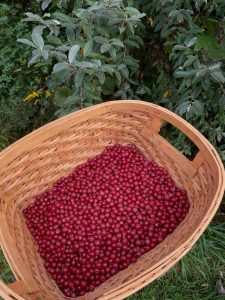
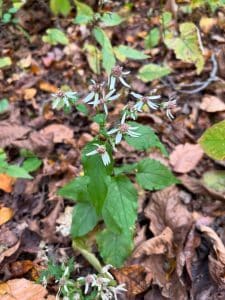
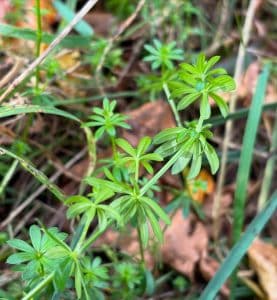
One Response
I like me some biscuits and MUSTARD